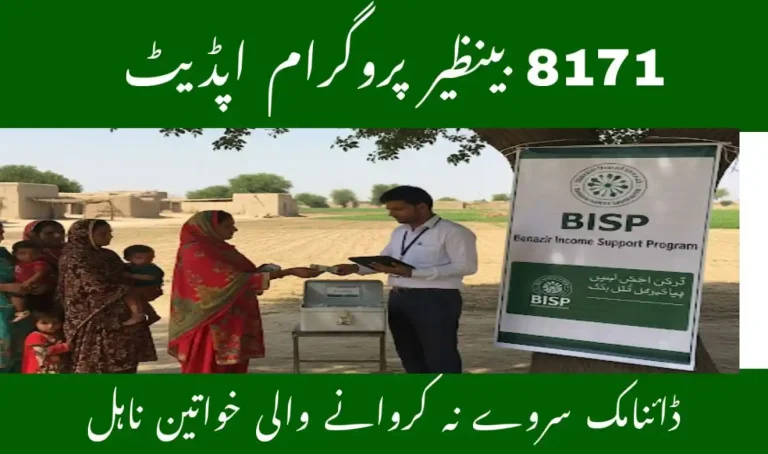How Tax-Filer Rules Affect BISP Families in Remote Areas

For many poor families in Pakistan, the Benazir Income Support Programme (BISP) is more than just a monthly payment—it’s a survival tool. But now, a new policy is putting that lifeline at risk. Families are being cut off from BISP support if someone in the household is listed as a tax filer.
This might seem fair on paper, but in remote villages, it’s causing serious problems. Let’s explore why this rule hurts people in far-off areas and what they can do about it.
What’s the New Rule All About?
The government wants to make sure BISP money only goes to those who really need it. So, they’ve started checking if anyone in a household has filed income tax or owns something big like land or a car.
If a match is found, the entire household loses BISP benefits, even if they’re struggling to make ends meet. It’s meant to prevent misuse—but it’s also punishing some poor families by mistake.
Why Remote Areas Are Struggling the Most
Families in rural and mountainous parts of Pakistan face challenges that city dwellers may never experience. Here’s why this new rule is hitting them the hardest:
1. No Access to Information
Many people in villages don’t know about the tax-filer policy. They wait for their payment, not realizing they’ve been removed from the list.
2. Hard to Reach Help
BISP offices are usually in towns or tehsils. Getting there takes time, money, and energy—things poor families don’t always have.
3. Mistaken Identity
Some people are flagged as tax filers even when they’ve never filed taxes. Maybe a relative used their ID, or an old registration was never cleared.
4. Zero Online Access
With no internet or smartphones, many rural families can’t check their status or file appeals online. This leaves them confused and helpless.
What Happens When Payments Stop?
Losing BISP support can create a domino effect in people’s lives. Here’s what many families face:
- Food becomes scarce
Some families go hungry without that extra bit of cash. - Children may drop out of school
Uniforms, notebooks, and travel costs become unaffordable. - Medical help is delayed
A sick child or elder might not get treatment in time. - Mental stress increases
Many women, who rely on BISP payments, feel ashamed and afraid.
“Why Did My BISP Payment Stop?” – Common Questions
Here are the answers people in affected areas want most:
What does “tax filer” even mean?
A: It’s someone who’s listed with the government as having filed a tax return or owning valuable property.
But I didn’t file taxes—why am I affected?
A: Sometimes, mistakes happen. Maybe your name is in someone else’s record, or an old registration shows you as a filer.
Can I fix this?
A: Yes, you can go to a nearby BISP office, ask for a review, and submit proof that you still qualify for support.
What You Should Do If You’re Disqualified
If you think you’ve been unfairly removed from BISP, don’t panic. Follow these steps:
- Visit your nearest BISP center and ask why you were disqualified.
- Bring documents like your CNIC, spouse’s CNIC, and any income or land records.
- Explain your situation clearly to the officer.
- Ask for a re-verification, especially if you think a mistake was made.
- Follow up after two weeks to check if your case has been resolved.
What Can Be Done to Make the System Fair?
To help families in far-off places, here’s what the BISP system could do:
- 🌍 Send mobile teams to villages for checks and appeals
- 📢 Use radio and mosque announcements to share new rules
- ✍️ Accept written confirmation from local leaders or union councils
- 📞 Set up call lines in local languages with shorter wait times
- 🧾 Print simple notices when people are disqualified—so they know why
Before vs. After the Rule: What Changes for Families?
| Situation | Before Rule | After Disqualification |
|---|---|---|
| Monthly Cash Aid | Received regularly | Stopped completely |
| Access to Food | Some stability | Uncertain meals |
| Medical Care | Basic help possible | Often delayed or skipped |
| Trust in System | Fair and helpful | Frustrating and unclear |
Final Thoughts: Rules Must Be Fair, Not Just Strict
It’s true that social welfare should be protected from misuse. But in trying to block the rich, we must not punish the poor—especially those living in Pakistan’s most neglected areas.
Most families in remote areas are not tax evaders or cheaters. They’re just trying to survive. Many don’t even know they’re marked as tax filers. All they ask for is a chance to explain, to prove their poverty, and to continue receiving the help they need.
Let’s hope future changes to the BISP system are made with more compassion, clarity, and access—so no poor family is left behind.
Tax-filer disqualifications are cutting off BISP aid in remote areas. Learn how this policy affects poor families and what steps can be taken to fix it.
Read this: Benazir Nashonuma Program 2025 – Support for Pregnant Women & Children in Pakistan
Read this: Challenges Faced by BISP Beneficiaries in July Heatwave
Disclaimer: This article is for informational purposes only. We are not affiliated with any government agency. For official updates, visit the official BISP website.
This content is based on publicly available information. We are not affiliated with BISP or any government body. Read full disclaimer here






